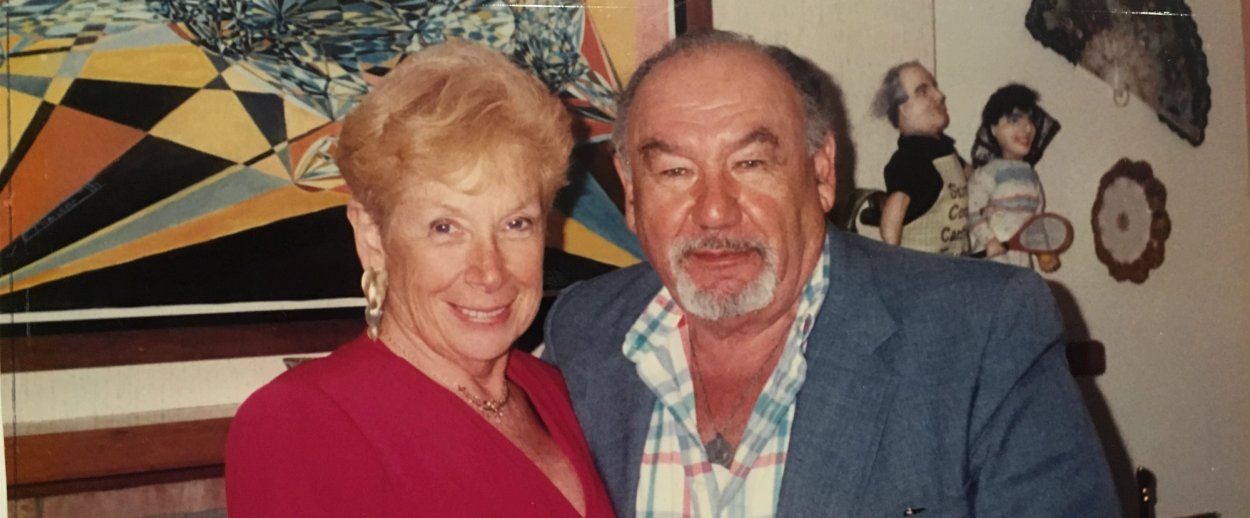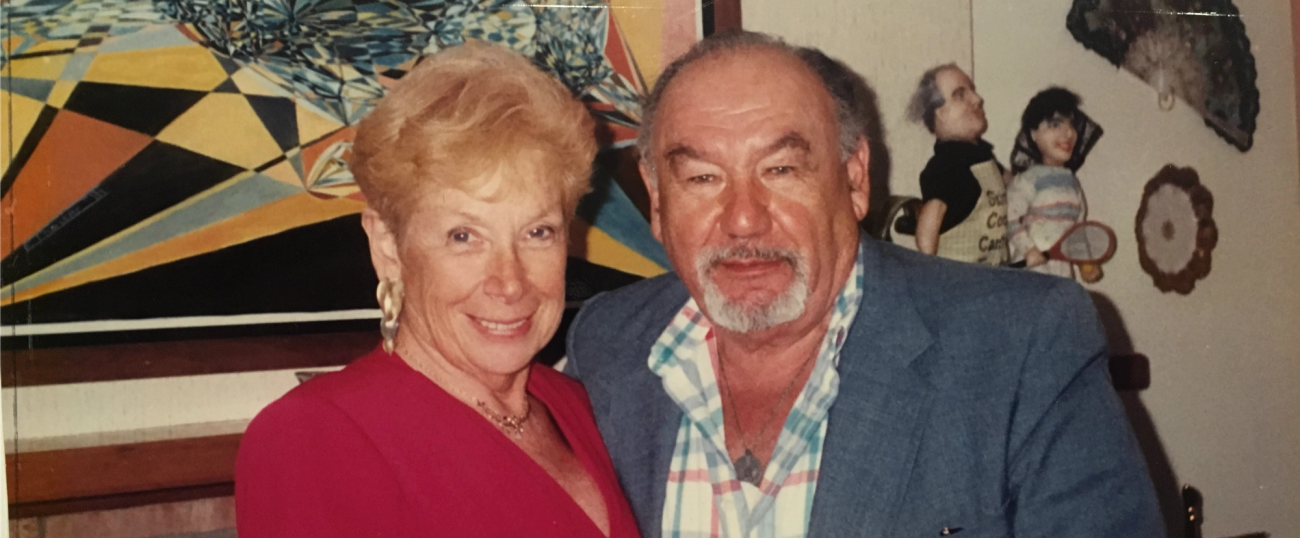Holding an ‘Illegal’ Shiva for My Mom
When the start of Sukkot delays a funeral for days and means there can be no shiva, it shakes a mourner’s foundations




I used to believe in a Jewish version of Benjamin Franklin’s adage that the only certainties were death and taxes. I thought: “the one thing you can count on when a Jew dies is a speedy funeral followed by a restorative period of shiva.”
Then my mom died and everything I thought I knew about the Jewish rituals surrounding death and mourning was shaken.
My mom died less than a month ago, on a Saturday evening, too late to arrange for a Sunday funeral. When I spoke to our rabbi, he informed me that since Sukkot started on Sunday evening, the first day we could possibly have the funeral was Wednesday. And because of Sukkot, there would be no shiva.
“A wait for the funeral? No shiva?” I asked incredulously. “Are you going to tell me now it’s okay to eat pork?” The rabbi, who was used to my impertinence, chuckled and we made plans.
My mom was proudly Jewish, but not particularly observant. Her sense of Jewishness was forged growing up in Yorkville, a neighborhood on New York’s Upper East Side once known as “Germantown.” In the 1930s and 40s, members of the Bund—Nazi sympathizers—marched through Yorkville making trouble for the Jews, picking fights and smashing windows. My mom’s father lost a saloon because anti-Semites sent in an older-looking underaged drinker, and then called the authorities on him. She had a tough childhood, filled with the death of loved ones due to cancer and heart attacks. Before she was born, a set of twins were killed when the carriage they were riding in was struck by a streetcar. Her beloved father died when she was only sixteen.
Like an old movie flashback, I think of her first two decades as bleak, black and white. That’s not entirely fair, of course. My mom excelled in school, especially in math, had lots of friends, and explored the city by foot every day after school. She worked to have a normal life, but she was the youngest of nine, and by the time she was born, her mother was tired, her father was old, many of her siblings were already adults, and she was often left to her own devices.
The scene changes to color right after the war, on a beach in Rockaway.
July 4, 1946. She’s on a blanket, sharing it with a spread-out New York Times. A coming-home Marine from that brutal war saunters over. No fat, just swagger. My mom was a looker. In her words: “I had a cute figyuh, I must say.” He looks her over, eyes darting from her reclining in high heels on the blanket, to The Times. He utters the lamest pickup line of the 40s. “I’m back from the war. Can I look at your want ads?
She hands over the paper because he seemed like a good guy, but remembers thinking: “Why didn’t I attract someone who was making money already?”
Thus began a love affair that stretched from that beach, produced my brother and me, five grandchildren, and ended with my father Irving’s death in Florida four years ago. My mother was a model of modernity, loving fashion, the latest novel, the cool French movie, and as many parties as she and my father could get invited to.
She loved parties!
She went to services because my father dragged her. When my son Micah was about bar mitzvah age, my mother was embarrassed that she couldn’t read or speak Hebrew, so she learned Hebrew for the sake of her grandchildren. That led to her having a bat mitzvah in her 60s, along with a great party.
During her life with Irving, her personality took a back seat to a man who was always on, prone to suck all the oxygen out of any room he was in. My father was hysterically funny. It turns out, my mother was as well, but we didn’t see that at first, because Irving was the headliner. That started to change with his illness and her emergence. We discovered her unintentional hilarity. It was like going to some hole-in-the-wall comedy club, and discovering an unknown comic with a cult following, who happened to be your mother.
“I have a lot of problems with computers and technology. People five years younger than me get it.”
“Even when Zayde’s stories didn’t make sense, they still had a good punch line.”
“The New York Times is so amazing, I don’t understand half the things I’m reading.”
“I didn’t get that email you sent me. Maybe it’ll come in tomorrow’s delivery…”
“I’m home for the night. Just me and Bill Maher.”
Because of logistics, the funeral wasn’t going to take place until Thursday, a day after the first opportunity that we could hold it. I found the time until then particularly difficult because my internal Jewish clock was set to an established rhythm: death, funeral, shiva, back to life. Instead I had four-and-a-half days when I couldn’t say kaddish, kept picturing my mother’s earthly remains in the morgue at the funeral home, and wasn’t surrounded by my immediate and extended family. So, I went back to work, to the university where I teach, and had to answer well-meaning questions from my sympathetic colleagues as to “Why are you even here, Mark?”
I wondered that myself. I couldn’t banish the thought of my mother not here, but not there. I had a dream:
My mother has died. My father, who is still alive, tells me that I can go in the room to view her. With trepidation, I walk into in the room. My mom strikes up a conversation: “How are you Moishe. You look worried.” We talk about cottage cheese and pasta, her favorite dish, the grandkids, and what she’ll miss. I go out of the room and say to my father: “We can’t bury her. She’s talking to me.” He says: “We can’t anyway. It’s Sukkot.”
The bleak weather exacerbated my unsettled mood. On Tuesday and Wednesday, it rained all day, heavy torrents that flooded parts of New Jersey. I ran from the building where my classes are to the parking garage and forgot to open the umbrella I was carrying.
Thursday finally arrived, a day of brilliant sunshine and temperatures in the low seventies. The funeral was a celebration of my mother’s deep humanity and unbridled optimism. My daughter Leah spoke:
“A few nights ago I was re-listening to some voicemails that I had saved from my Grandma Ruthie. I found one from March of 2014…
‘I wanted to tell you that I read your article on coconut oil and I just bought some zucchini pancakes from Glicks and I made them for dinner and they were very good. So that went right to use, I made it with the coconut oil I had. And your article said it was healthier than everything else, olive oil and everything.’
“I am not quite sure how to articulate what this reveals about my Grandma Ruthie, but I think it says something about her zest for life. How she treated my (and all her loved one’s) suggestions and ideas with the utmost respect and immediately put them to use. How she was open to embracing new and alternative oils and ways of thinking, even in her nineties. Being with her, for me, was like being with my aspirational kindred spirit. I admire her and I feel so deeply connected to her, like we were made from the same cloth.”
I felt at peace. Sad of course, but relieved that my mother lived into her 93rd year, and though the last two years were tough, she did have special moments, like when Leah and her husband, Nate, staged a separate wedding ceremony, complete with chuppa, at the nursing home.
My equanimity was threatened when the Rabbi informed us that the rains of the past two days had dropped 11 inches onto the cemetery, and we weren’t sure what to expect when we got there. But I should have channeled my mother and assumed the best. The cemetery was dry, and the graveside portion went off perfectly.
Back at our house, we held a non-shiva shiva. Mirrors stayed uncovered, family and friends and colleagues descended upon our house and we talked about my mother well into the night. There was plenty of food, plenty to drink.
That’s when I realized that, though I might have felt thrown out of sync at first by the unexpected scheduling, it really was all for the good. My mother got a grand send-off, filled with at turns poignant and hilarious paeans to her warmth and sense of humor. And she would have loved the non-shiva shiva. It wasn’t interrupted by a minyan and solemnity. It was just a damn good party.
As my mother told us as we were planning her 90th birthday party in Florida three years ago:
”All I care about is that we’re all together….and the hall is nice…and the food is delicious.”
Mark Effron, a veteran television executive, now teaches journalism and television and digital media at Montclair State University in New Jersey.